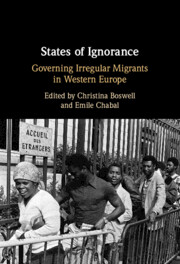Book contents
- States of Ignorance
- States of Ignorance
- Copyright page
- Contents
- About the Editors and Contributors
- Acknowledgements
- Introduction
- 1 States, Knowledge and Ignorance
- 2 The Post-war European State and (Irregular) Migration
- 3 The Invention of Illegal Immigration
- 4 (Im)perfect Control
- 5 From Ignorance to Illegalisation
- 6 Denial, Elucidation or Resignation? British and German State Responses to Unauthorised Migrants
- 7 To See or Not to See
- 8 European Integration and the Leap into the Unknown
- 9 Control Infrastructures and Ignorance
- Index
- References
2 - The Post-war European State and (Irregular) Migration
A Historical Perspective
Published online by Cambridge University Press: 02 November 2023
- States of Ignorance
- States of Ignorance
- Copyright page
- Contents
- About the Editors and Contributors
- Acknowledgements
- Introduction
- 1 States, Knowledge and Ignorance
- 2 The Post-war European State and (Irregular) Migration
- 3 The Invention of Illegal Immigration
- 4 (Im)perfect Control
- 5 From Ignorance to Illegalisation
- 6 Denial, Elucidation or Resignation? British and German State Responses to Unauthorised Migrants
- 7 To See or Not to See
- 8 European Integration and the Leap into the Unknown
- 9 Control Infrastructures and Ignorance
- Index
- References
Summary
This chapter offers a historical overview of the governance of irregular migration as a key element in the construction of the post-war European state. It explores four moments, each of which represents an evolution of state capacities in relation to the control of (irregular) migration. The first moment is the immediate post-war period, in which large-scale population movement and displacement led to the emergence of a set of legal frameworks that were designed to regulate these social realities at a collective level. The second moment corresponds to the end of the European colonial empires in the 1950s and 1960s, when contests over citizenship, residency and movement rights reshaped the political framework of 'irregularity'. The third moment corresponds to the 'closure' of West European borders in the mid-1970s, after which both regular and irregular migration emerged as a social problem. Finally, the fourth moment runs from the 1990s to the present-day. This period has been characterised by a radicalisation of the politics of immigration, as well as processes of Europeanisation that have sought to monitor individual migrants.
- Type
- Chapter
- Information
- States of IgnoranceGoverning Irregular Migrants in Western Europe, pp. 59 - 90Publisher: Cambridge University PressPrint publication year: 2023

